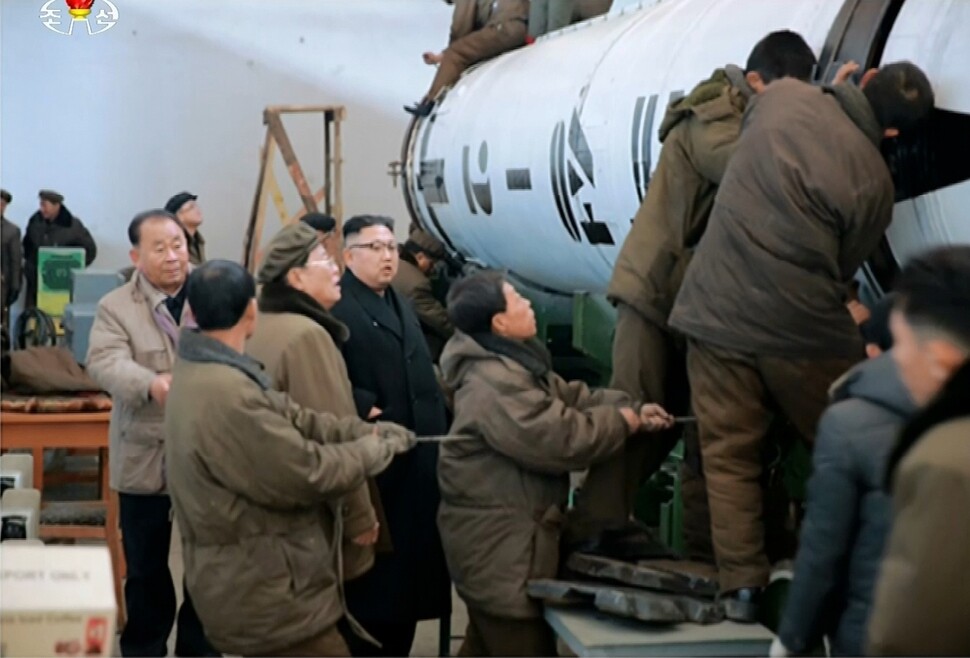hankyoreh
Links to other country sites 다른 나라 사이트 링크
[Editorial] To deal with North Korea, we must build a system of cooperation

North Korea claimed on Feb. 13 that the missile it test launched into the East Sea was a “surface-to-surface intermediate-range ballistic missile (IRBM),” which it is calling “a new strategic weapon system.” The South Korean government also confirmed that this was a ballistic missile using the new solid fuel that the North applied to its submarine-launched ballistic missiles (SLBM). This is a situation that demands new efforts to address the issue of North Korea’s nuclear and missile programs, which are growing more sophisticated despite the sanctions of the international community.
A report in North Korea’s state-run media claimed that North Korea had “created the amazing miracle of completing a new strategic weapons system in the short period of just six months.” The North has made clear its primary objective is increasing its technological level and showing this off both at home and abroad. In the past, such efforts have attracted the attention of Pyongyang‘s neighbors and been the trigger for new negotiations. But the situation is different now that North Korea has carried out no fewer than five nuclear tests. The international community immediately condemned North Korea’s provocation and is discussing new sanctions. We hope that North Korea will recognize how alien its rash behavior is to the mood in the global village.
But this missile launch must not discourage us from seeking a variety of solutions to the nuclear issue. There is a particular need for an honest reappraisal of the limitations of the current approach, which depends solely on increasing sanctions and pressure and emphasizing the role of China. There are even bigger problems with the preemptive strike and secondary boycott that some are proposing. A preemptive strike is a military tactic that is predicated on war and is separate from a solution to the nuclear issue. The fact that this is nevertheless mentioned repeatedly is due to irresponsibility and incompetence, presuming that it does not reflect the interests of the military-industrial complex. A secondary boycott aimed at China is also likely to only worsen the nuclear issue by exacerbating the conflict between the US and China.
What we currently need to start discussing is building a system of cooperation among related countries to find a fundamental solution to the nuclear issue. The most important thing is for South Korea and the US to make clear that they are responsible for working toward a solution to the nuclear issue and to find ways to secure the active cooperation of China and Russia. Toward this end, it is essential that the US and China decouple the nuclear issue from other issues and engage in strategic cooperation. It is also important for the South Korean government to create various channels of dialogue with North Korea and other countries connected with the Korean Peninsula instead of relying solely on increasing sanctions and pressure on the North.
We must not hastily conclude that there is no chance of North Korea giving up its nuclear program. The Pyongyang regime’s sense of crisis is one of its motivations for developing nuclear weapons. In order to make North Korea halt its dangerous provocations, well-coordinated and constant effort is necessary.
Please direct questions or comments to [english@hani.co.kr]

Editorial・opinion
![[Column] Tariffs on China: Trump was dumb, Biden dumber [Column] Tariffs on China: Trump was dumb, Biden dumber](https://flexible.img.hani.co.kr/flexible/normal/500/300/imgdb/original/2024/0520/191716191153918.jpg) [Column] Tariffs on China: Trump was dumb, Biden dumber
[Column] Tariffs on China: Trump was dumb, Biden dumber![[Column] What if Seoul took reunification by force off the table? [Column] What if Seoul took reunification by force off the table?](https://flexible.img.hani.co.kr/flexible/normal/500/300/imgdb/original/2024/0520/3017161928630494.jpg) [Column] What if Seoul took reunification by force off the table?
[Column] What if Seoul took reunification by force off the table?- [Editorial] Intensifying US-China rivalry means Seoul must address uncertainty with Beijing sooner than later
- [Column] When ‘fairness’ means hate and violence
- [Editorial] Yoon must stop abusing authority to shield himself from investigation
- [Column] US troop withdrawal from Korea could be the Acheson Line all over
- [Column] How to win back readers who’ve turned to YouTube for news
- [Column] Welcome to the president’s pity party
- [Editorial] Korea must respond firmly to Japan’s attempt to usurp Line
- [Editorial] Transfers of prosecutors investigating Korea’s first lady send chilling message
Most viewed articles
- 1To weigh costs and benefits, Korea must stop treating US troop presence as a sacred cow
- 2Kim Jong-un wanted to meet with residents of shelled Yeonpyeong Island in South, Moon recalls in mem
- 3Xi, Putin ‘oppose acts of military intimidation’ against N. Korea by US in joint statement
- 4Berlin mayor hints at tearing down ‘comfort women’ memorial in city
- 5[Column] What if Seoul took reunification by force off the table?
- 6[Column] Tariffs on China: Trump was dumb, Biden dumber
- 7[Editorial] Transfers of prosecutors investigating Korea’s first lady send chilling message
- 8For new generation of Chinese artists, discontent is disobedience
- 9New doc undoes stereotypes of N. Korea with candid portraits of women’s football legends
- 10[Column] In Germany, Japan is waging a war over its history with Korea